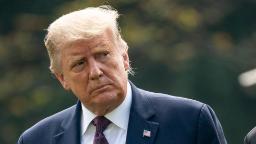[ad_1]

CNN
—
The first-ever criminal indictment of a former American president creates a uniquely perilous moment for a polarized republic already repeatedly driven to the brink by the endless norm-busting of Donald Trump.
The prosecution of the 45th president – and his attempts to inflame a partisan firestorm to protect himself – are likely to consume America’s already poisoned politics, threaten to rock yet another presidential election and may pose the most critical challenge yet to its system of justice.
It is the latest stunning barrier shattered by the nation’s most unruly president. And it means that after a tumultuous four-year term, a historic two impeachments, an election falsely tainted by Trump’s lies about fraud and a mob attack by his supporters on Congress, a new national nightmare may be ahead.
In a momentous step Thursday, a Manhattan grand jury voted to indict Trump on what sources said were more than 30 counts related to business fraud in a case arising from hush money paid to adult film star Stormy Daniels, possibly to defuse a scandal ahead of the 2016 election.
There is nothing in American history that approaches the tumult of the charging and possible trial and conviction of a former president – especially since Trump and his supporters are already claiming that the indictment represents the weaponized politicization of the justice system.
“We have been close before (but) we have never been at this point,” John Dean, former President Richard Nixon’s Watergate-era special counsel, told CNN. “No prior president – former, sitting or otherwise – has ever been indicted.”
Given the extreme national political estrangement exacerbated by Trump, this case is likely to leave the country changed however it turns out. There will be fears, for instance, that it will crush one of the last remaining precedents for political restraint and leave future presidents vulnerable to prosecution in a manner more akin to fragile failing states than the world’s most vital democracy. Yet at the same time, if Trump has indeed committed crimes, a failure to pursue him would send a message that the powerful can get away with behavior that ordinary Americans cannot.
The move was especially stunning given Trump’s long record of impunity, which has seen him constantly stretch the limits of the law and the conventions of accepted behavior with his uproarious personal, business and political careers. Suddenly, Trump’s decades of evading accountability will end. The former president will have to start answering for his conduct, likely beginning in court on Tuesday after he travels to New York to be arraigned in what will be a high-security spectacle given his past incitement of violence.
Trump insists he is innocent of all allegations, in this case as well as in several others that may pose even greater legal peril, including special counsel investigations into his hoarding of classified documents and his conduct around the 2020 election and a separate Georgia investigation into his bid to steal the election in the swing state.
The ex-president quickly showed he’s ready to drive the country into a deep political crisis as he mounts his defense with wild claims of persecution. He accused Democrats of weaponizing justice to thwart his 2024 White House bid – a claim that threatens to shatter the credibility of the next election in the eyes of millions of his followers and further damage US democracy.
“This is an attack on our country the likes of which has never been seen before,” Trump wrote in block capitals on his Truth Social network. “It is likewise a continuing attack on our once free and fair elections. The USA is now a third world nation, a nation in serious decline. So sad!”
Like all Americans accused of crimes, Trump is entitled to the presumption of innocence and his full rights under the Constitution, which he tried to overturn on January, 6, 2021. The perception of this extraordinary case will turn on two questions fundamental to the credibility of American justice: Are all citizens – even the most powerful, like former presidents and White House candidates – considered equal under the law? Or is Trump being singled out because of who he is?
The indictment voted by the grand jury remains under seal, so the exact charges and the extent of evidence against him remain unclear. But many legal experts have questioned whether a case possibly alleging fraudulent accounting and subsequent infringements of election law would rise to the magnitude that might justify the nation-shaking act of indicting a former president and frontrunner for the 2024 GOP nomination. Some observers have warned against a case that might rely heavily on the testimony of former Trump lawyer Michael Cohen, who made the payments to Daniels and has already served a jail sentence for charges that included lying to Congress.
Even if there is plentiful evidence that makes this a relatively simple sell to a jury, the fame and the power of the defendant means the case will unfold in a court of public opinion. Manhattan District Attorney Alvin Bragg is under enormous pressure since if he fails to secure a conviction, he will be accused even more than he already is of building a politicized case that could tear gaping new divides in the country.
Trump’s most fervent supporters in the House of Representatives lambasted Bragg despite having not seen the charges or evidence against the former president. The angry reactions were consistent with Trump’s previous attempts to intimidate Bragg, which were set off nearly two weeks ago with his inaccurate prediction that he’d be arrested early last week. The strategy was clearly designed to prejudice public opinion against the case before Trump even appears in court and to energize the former president’s grassroots supporters and the conservative media machine.
“Outrageous” was the only comment issued by House Judiciary Chair Jim Jordan of Ohio, one of the ex-president’s most staunch loyalists.
House Speaker Kevin McCarthy tweeted, “The American people will not tolerate this injustice,” and added that “The House of Representatives will hold Alvin Bragg and his unprecedented abuse of power to account” – a comment that appeared to indicate a fresh attempt to use government power to interfere in an active case going through America’s independent legal system.
The No. 2 House Republican – Majority Leader Steve Scalise – called the indictment “one of the clearest examples of extremist Democrats weaponizing government to attack their political opponents.” Rep. Elise Stefanik, the House GOP conference chair, released a statement saying the indictment was “a political witch hunt” and a “dark day for America.” There was no immediate comment, however, from Senate Republican Leader Mitch McConnell, underscoring the divides in the GOP over Trump’s past assault on American democracy and political aspirations.
It is too early to predict how voters, in the GOP primary or in the national electorate, will respond to Trump’s indictment. And it is also unclear whether a possible trial would take place before the 2024 election or where the multiple other investigations into Trump’s conduct will be by then.
But Thursday’s historic news out of Manhattan immediately scrambled the GOP nominating contest.
The move forced the ex-president’s potential Republican rivals into hurried condemnations to preserve their own viability among GOP voters.
“I think the unprecedented indictment of a former president of the United States on a campaign finance issue is an outrage,” former Vice President Mike Pence told CNN’s Wolf Blitzer in an interview. “It appears to millions of Americans to be nothing more than a political prosecution that’s driven by a prosecutor who literally ran for office on a pledge to indict the former president.”
Trump blames Pence for failing to intervene in Congress’ certification of President Joe Biden’s election victory – a position that may limit the former vice president’s political ceiling in a party still filled with Trump loyalists.
Any immediate political boost Trump is able to engineer from the indictment could harm his potential strongest primary rival, Florida Gov. Ron DeSantis. Like other potential candidates, DeSantis had no political room to do anything other than condemn the indictment – even though he has been portraying himself as a potential president who would be far more calm, methodical and effective in implementing a hardline conservative agenda than Trump was.
But DeSantis also made an extraordinary threat that if Trump were to resist turning himself in, he would refuse to participate in any attempt by New York to extradite him – a move that, if it happened, could precipitate a constitutional crisis.
“The weaponization of the legal system to advance a political agenda turns the rule of law on its head. It is un-American,” DeSantis tweeted. “Florida will not assist in an extradition request given the questionable circumstances at issue with this Soros-backed Manhattan prosecutor and his political agenda.”
The Florida governor’s threat was just one ill omen that suggests the months ahead will be divisive and dangerous to America’s democracy – whether Trump is found guilty or not.
[ad_2]
Source link










